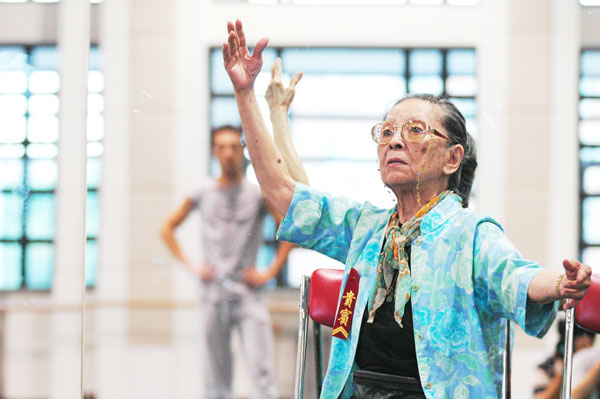Nations linked by dance
Updated: 2013-06-02 02:22
By Deng Zhangyu (China Daily)
|
||||||||
Although Dai Ailian, the Trinidad-born doyenne of dance in China, passed away seven years ago, her spirit of exploring dance from different cultures continues to inspire exchanges between the people of China and Trinidad and Tobago.
Known as mother of Chinese dance, Dai spent her childhood in Trinidad with her family. A pioneer of Chinese dance, she combined the ballet she learned from the West with traditional Chinese folk dance. She devoted her life to introducing China's little-known ethnic traditions to the world.
 |
|
Dai Ailian devoted her life to the development of Chinese dances. Han Yuan / For China Daily |
In 2010, the Chinese ambassador to Trinidad and Tobago and local people of Chinese descent set up a foundation named after Dai Ailian to expand cultural exchange between China and the Caribbean nation.
Its first project was to sponsor talented dancers to study Chinese dance for a year at the Beijing Dance Academy, which was founded by Dai Ailian in 1954.
"Based on the special dance ties between the two countries, we hope to build a deeper cultural exchange. We will continue to provide full scholarship to dancers from Trinidad and Tobago," said Zhang Ping, director of the foreign cooperation and exchange center at the Beijing Dance Academy.
The first two dancers came to study in Beijing in 2011. They could attend any dance class that interested them. Both were given a dance mentor. The school also made a choreography on a Chinese folk dance for them to perform after they completed their yearlong studies.
Zhang said both of the first two dancers are talented because their homeland has a strong tradition of dance and singing.
When they returned to Trinidad, they were invited to perform Chinese folk dances on many important occasions, such as at their country's national day concert.
"Of the foreign students in our school, we pay special attention to students from Trinidad. We have a feeling of kinship with them because of our founder Dai Ailian. We hope they will bring the seeds of Chinese dance to Dai's birthplace," Zhang said.
After studying modern dance at the academy for 10 months, Anya Elizabeth Reyes, from Cunupia, a town in central Trinidad, expressed a desire to pass on what she has learned.
"I'll go back to dance schools in my country to share what I learned from China, to communicate with people in my country about Chinese dance," the 20-year-old said.
After receiving a scholarship from the Dai Ailian Foundation, Reyes decided to go first to China instead of beginning her first year as a visual arts major at a university in Trinidad. She had been studying dance at different dance schools from the time she was 5 years old.
"We always incorporate different styles of dance, like Indian dance and African dance. But we don't have Chinese dance, so it's perfect for me to learn it in China," Reyes said.
Reyes has won some dance prizes in China. Now she is practicing Tibetan dance - a Chinese folk dance - to prepare for the final round of a national talent competition among foreign students in China.
"I have had such a great experience here. China's history and culture fascinate me. And I have had the chance to see the best of Chinese dances. Quite amazing! " Reyes said.
Zhang, the director of the academy's foreign cooperation and exchange center, visited Trinidad and Tobago in 2011. He said he was impressed by the local carnival parade that featured an African dance to beating drums.
"Everyone in the parade was excited by the drum beats, " Zhang said.
The Beijing Dance Academy and Dai Ailian Foundation are thinking about introducing Trinidadian dance to China. And they are finding opportunities to put Chinese folk dances on stage in Trinidad.
"The two countries have a dance connection. We should and are obliged to increase exchanges to pay tribute to Dai, the legendary dancer," Zhang said.

 Michelle lays roses at site along Berlin Wall
Michelle lays roses at site along Berlin Wall
 Historic space lecture in Tiangong-1 commences
Historic space lecture in Tiangong-1 commences
 'Sopranos' Star James Gandolfini dead at 51
'Sopranos' Star James Gandolfini dead at 51
 UN: Number of refugees hits 18-year high
UN: Number of refugees hits 18-year high
 Slide: Jet exercises from aircraft carrier
Slide: Jet exercises from aircraft carrier
 Talks establish fishery hotline
Talks establish fishery hotline
 Foreign buyers eye Chinese drones
Foreign buyers eye Chinese drones
 UN chief hails China's peacekeepers
UN chief hails China's peacekeepers
Most Viewed
Editor's Picks

|

|

|

|

|

|
Today's Top News
Shenzhou X astronaut gives lecture today
US told to reassess duties on Chinese paper
Chinese seek greater share of satellite market
Russia rejects Obama's nuke cut proposal
US immigration bill sees Senate breakthrough
Brazilian cities revoke fare hikes
Moody's warns on China's local govt debt
Air quality in major cities drops in May
US Weekly

|

|







